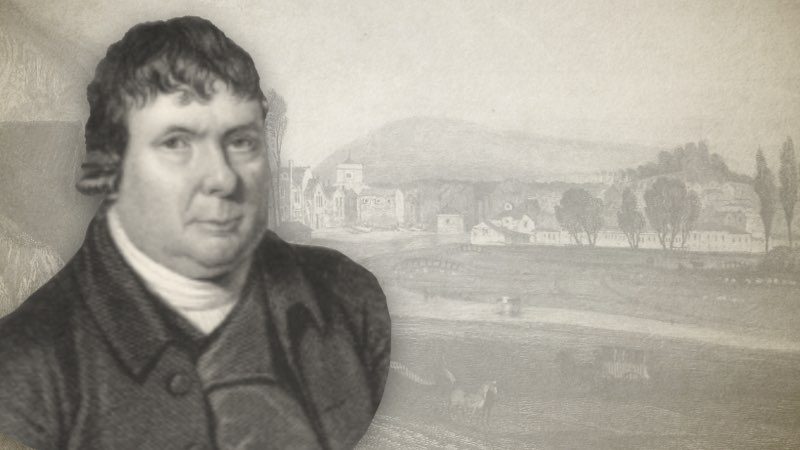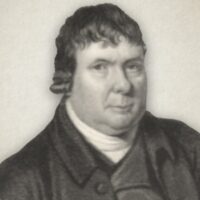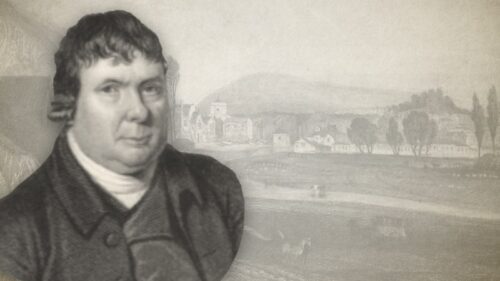
The Child of Liberty in Legal Bondage: Despondency (7/11)
I now proceed to the 7th particular. Despondency and desperation.
The operations of this spirit of bondage, and the sensible displeasure of God felt in it, bow the soul down. “I am bowed down greatly; I go mourning all the day long.” The Holy Spirit of God is grieved, and does not operate as a comforter; hence the complaint – “The comforter, that should relieve my soul, is far from me,” Lam. i. 16. “Thou hast removed my soul far off from peace; I forgat prosperity; and I said, My strength and my hope are perished from the Lord,” Lam. iii. 17, 18.
The sensible presence of God appears to be wholly withdrawn, and nothing left but a bitter sense of our loss, and the remembrance of former halcyon days, which the soul is ready to conclude are gone for ever. “O that I were as in months past, as in the days when God preserved me, when his candle shined upon my head, and when by his light I walked through darkness; as I was in the days of my youth, when the secret of God was upon my tabernacle; when the Almighty was yet with me; when my children were about me; when I washed my steps with butter, and the rock poured me out rivers of oil!” Job, xxix. 2-6.
Looking back to former indulgences, and to former banquets, is the chief employ of a soul thus influenced. “There is bread enough in my father’s house, and to spare, [saith the prodigal,] but I perish with hunger;” and fearing that he should be damned as an apostate or as an hypocrite in Zion, he wished to be reduced to the level of a common bond-servant. “I have sinned against heaven, and in thy sight, and am no more worthy to be called thy son: make me as an hired servant.” Thus legal bondage, meeting with guilt in his conscience, brought him to himself.
But then it may be asked, why such good men, and especially such a man as Job, who obtained so good a report through faith, and to whom God gave so great a testimony as to call him “a perfect and an upright man,” &c. &c. who was so abundant in every good word and work-why such a man should be exercised with legal bondage again? That he was abundant in good works is plain by what he advances: “I made a covenant with mine eyes, [to keep my heart chaste.] If I have walked with vanity, or if my foot hath hasted to deceit; if my step hath turned out of the way, and mine heart walked after mine eyes; and if any blot hath cleaved to my hands; then let me sow, and let another eat. If I did despise the cause of my man servant or maid servant when they contended with me; if I have withheld the poor from their desire, or have caused the eyes of the widow to fail, or have eaten my morsel alone, and the fatherless hath not eaten thereof; if I have seen any perish for want of clothing, or any poor without covering; if his loins have not blessed me, and if he were not warmed with the fleece of my sheep. The stranger did not lodge in the street, but I opened my doors to the traveller; yea, I was eyes to the blind, and feet was I to the lame. I plucked the spoil out of the teeth of the oppressor, and caused the widow’s heart to sing, for joy.” He had instructed many; his words had upholden them that were falling, and he had strengthened the feeble knees. “O that one would hear me! Behold, my desire is that the Almighty would answer me, and that mine adversary had written a book: surely I would take it upon my shoulder, and bind it as a crown to me: I would declare unto him the number of my steps; as a prince would I go near unto him.” I desire to “be weighed in an even balance, that the Almighty may know mine integrity,” Job, xxxi. 6.
Now it may be asked, Are not these good works? And it must be answered, Yes, they are. And is not this being fruitful, and abounding in the work of the Lord? It certainly is. But he calls all these performances his own. I did this, I did that; but never acknowledges the help and power of God, which “worked in him both to will and to do all these things.” He takes all the glory of his good works to himself, and robs God of the glory of his grace. If he was rich, who made him so? If he eschewed evil, who gave him a tender conscience, and that fear? If he was liberal, who opened his heart? David says, “What am I and my people, that we should offer thus willingly? To some it is given to gather together and to heap up, but not an heart given to do good therewith.” And who made Job to differ? If Job instructed many, who gave him wisdom? If he was eyes to the blind, who gave him understanding? If he strengthened the weak hands, whence came the blessing and the power? Job takes the glory of all these things to himself; but God was the agent and author of all these good works, and will not give his glory to another.
Come, Job (says God), you have performed wonders; and I must be greatly indebted to you, to be sure, for all these good fruits, which were put forth by my Spirit. You call for the Almighty to answer you. You call me our adversary, and weigh that I had written a book of your performances; you would take it on your shoulder, and bind it as a crown to you, and as a prince you would draw near to me. You desire to be weighed in an even balance, that I may know your integrity. You desire to reason with God. You tell me enough of what you have done, but you say nothing of my working in you to will and to do. Wherefore I will cease working in you. My presence, my visitations, my dew of grace, shall be withdrawn: and I will send my law and its demands into your conscience, and you shall see what that requires, and how infinitely short your obedience comes when laid to that rule; and by that law I will neither minister my grace to you, nor work in you; that law is your debt-book, that law is the hand- writing that is against you. Now cast up your accounts, and see what I owe you, or what you owe me. By my law you shall have the knowledge of your sin, and in that law I will hide my face, and I shall then see how you go on without me. “Wherefore hidest thou thy face from me, and holdest me for thine enemy? Wilt thou break a leaf; wilt thou pursue the dry stubble? For thou writest bitter things against me, and makest me to possess the iniquities of my youth,” Job, xiii. 24-26. Job is now got to the black mount. God’s face is hid. He feels the law working wrath in him. “Thou holdest me for thine enemy.” The hand-writing is before him. “Thou writest bitter things against me.” And by the law is the knowledge of sin. “I possess the iniquities of my youth.”
Why do you cry out, Job? This is the even balance of my sanctuary, in which you wished to be weighed. Come, Job, I have not done with you; I will take you away from my mercy seat: the Ransom, the Surety, and the Redeemer, that I have provided, shall be out of spirit for a while; and I will draw near to you in wrath, and on a throne of judgment: for thou knowest but little of me yet. “And dost thou open thine eyes upon such an one, and bringest me into judgment with thee? O that thou wouldest hide me in the grave, that thou wouldest keep me in secret till thy wrath be past; that thou wouldest appoint me a set time, and remember me,” Job, xiv. 3-13.
Now, Job, you are at a throne of judgment, and you feel my wrath in the law against you as a transgressor; and where are now all your good works? Will they answer for you? Oh, no, if he will enter into judgment with man he cannot answer him one of a thousand. In this even balance you are found wanting, Job, I am indeed; therefore put me in a surety with thee. And now where wilt thou go? O let me go to the throne of grace. O that I knew where I might find him, that I might come even to his seat. What do you want to get there for, Job? Why to get away from a throne of judgment, from the hand-writing, from the wrath of God, and from my angry judge; for there, at the mercy-seat, “the righteous might dispute with him; so should I be delivered for ever from my Judge,” Job, xxiii. 7.
A child of God (like Job) who has known the benefits and blessings of a mercy-seat; who has experienced the dew of God’s grace; who has been blessed with the visitation of God; who has felt the candle of the Lord shining upon his head, and the Almighty’s presence with him, and the glory of God fresh in him (Job, xxix.); I say, for such a soul to be brought to the darkness of the old mount (where the face of God is hid); to be placed afresh before the hand-writing of the law; to have his corruptions stirred up by it; to possess the iniquities of his youth; to feel the wrath of God, yea the terrors, curses, and threatening, of the law; all these “arrows of the Almighty are within me (saith Job), the poison whereof drinketh up my spirit; the terrors of God do set themselves in array against me,” Job, vi. 4; I say, for a soul that is thus dealt with, and sensibly set before a throne of judgment, to be shut up in legal bondage, and grasped by the hand of an angry God, under which sensible anger Satan tempted him to blaspheme the Almighty, because he appeared in such wrath against him; I say, such a law-work, works nothing but despondency and desperation. “Do ye imagine to reprove words, and the speeches of one that is desperate?” Job, vi. 26.
We have got some fools in a profession, who tell us that a believer cannot be entangled again in legal bondage. “It is the working of his own corruptions,” say they, “and Satan’s temptations.” But the spirit of truth calls it “the anger of God, the wrath of God, the arrows of God, the terrors of God, the indignation of God, the burning jealousy of God, the heavy hand of God, the provocations of God, [and] the judgments of God:” and, until such fools can distinguish between the law of God and their own corruptions; between the arrows of God and the fiery darts of Satan; they are ignorant of God’s teaching, and ought to hold their peace, and be swift to hear, and slow to speak, and not set themselves up for masters, “lest they fall into the condemnation of the devil.”
But the true case and state of such men is this. They are conscious to themselves that they are in a splendid profession and yet are ignorant of this divine teaching; wherefore they call the lashes of their consciences, their fears, their apprehensions, their bondage, &C. the workings of the old man, and Satan’s devices against them; and that bearing up under and against these, is fighting the good fight of faith; whereas the truth of the matter is this: – it is the wrath of God, the bondage of the law, and the curse of it, working in their souls for their hypocritical profession; being destitute of the grace of God, and having never been born again of God; so that their fighting is beating the air. It is not the fight of faith, but of rebellion; not against Satan, but against both God and conscience; and God makes this manifest in every professor, whom he gives up to hardness of heart, to a fearful looking-for of judgment, to damnable heresies, to open profanity, to madness, or to self-murder. I proceed now,
William Huntington (1745-1813) was an English Calvinist preacher and prolific writer. His influence spread across the country and denominational lines. John Hazelton wrote of him—
“He published one hundred books, large and small, and once mentions being "weary at night, after having been hard at writing for fifteen hours during the day." Henry Cole wrote of him—‘’It may be asked why in my ministration, such as it is, I make frequent allusion to the ministry of that great and blessed servant of the Most High, the late Mr. Huntington. The reasons are these—1st. Because I believe he bore and left in Britain the greatest and most glorious testimony to the power of God's salvation that ever was borne or left therein. 2nd. Because I believe he planted the noblest vine of a Congregational Church that ever was planted therein; and 3rd. Because I believe the Churches that maintain the vital truths he set forth form a very essential feature in the Church-state of Christ in the land in these times, and perhaps will do so to the time of the coming day of God's retribution."
William Huntington, The Child Of Liberty In Legal Bondage (Complete)




